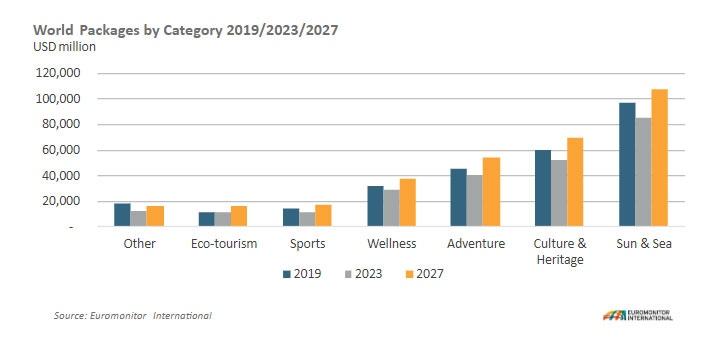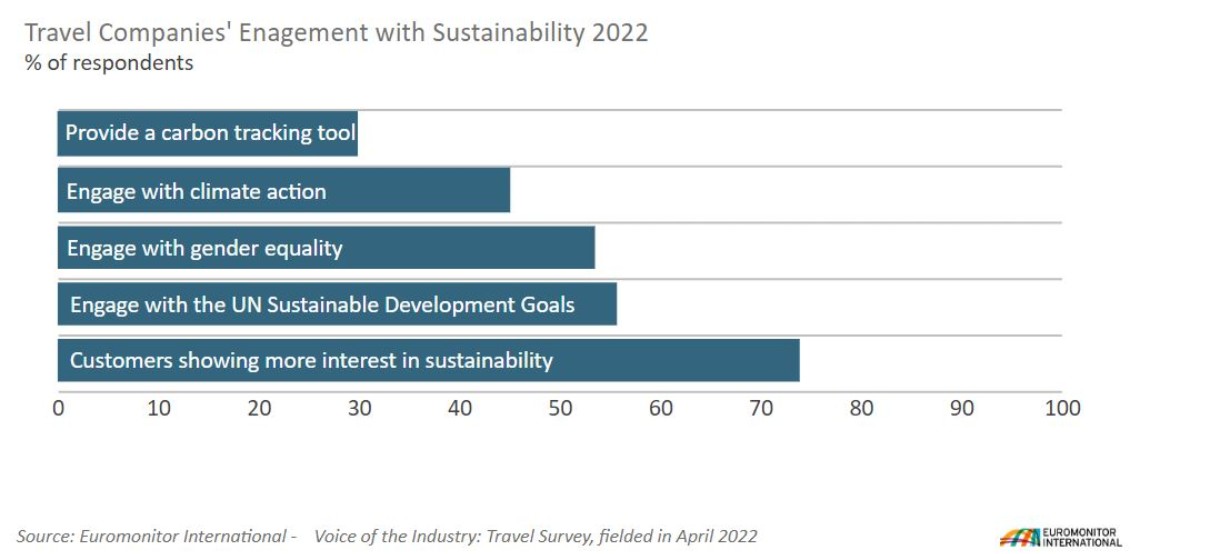At the same time, tourism as a sector is facing up to the existential crisis at its heart. Highly carbon intensive and dependent on fragile destinations, there is a growing collective effort to minimise negative impacts on the environment and local communities through joined-up thinking.
China – the catalyst for full recovery in tourism
After three long years, travel and tourism are finally in a position where every piece of the puzzle is in its place. The last of the restrictions have mostly been removed in regions like Asia Pacific, whilst China reopened to international tourism from 8 January2023, unleashing an important source of demand. According to Euromonitor’s Travel Forecast Model, updated in Q1 2023, world inbound tourism spending is expected to attain 83% of its peak levels in 2019, returning to full glory by 2024.
Euromonitor International expects there to be a “slow burn” in China outbound tourism in Q1 2023, as COVID-19 cases rise at home and geopolitical tensions are stoked abroad, with tit-for-tat travel restrictions reinstated in places. The expectation is that the surge from China will gather speed from Q2 2023 onwards, overall posting exceptional growth of over 400% in 2023 for outbound tourism spending, providing a much-needed shot in the arm for destinations especially in Asia Pacific.
The cost-of-living crisis that has gripped the world has led to decades-high inflation and will dampen global inbound tourism spending, with growth of 37% in 2023, having doubled by 103% in 2022.
Values-based tourism products strike a chord with consumers

Consumer values are filtering through to every aspect of their lifestyles where, increasingly, the choice of trip reflects the interests, beliefs and attitudes of consumers. This is epitomised by the blended travel (or “bleisure”) trend, where consumers are redefining their work-life balance and experiencing the joy of travel, whether through “workations” or work from anywhere policies.
Values-based offers such as sports, wellness and eco-tourism are all expected to outperform standard packages over 2023-2027, with average value growth of over 12% per year.
Wellness packages, where the focus is on holistic wellbeing, from yoga retreats to destination spas, are forecast to reachUSD29.3 billion in 2023. Wellness has demonstrated strong resilience during the pandemic, with less of a decline than other types of packages in 2020 (-65% vs -69% respectively).
Nature-based tourism – including adventure, eco-tourism, and sun and sea – is also enjoying increased consumer appetite, expected to account for 57% of all travel packages worldwide in 2023 alone. These packages encompass rural, beach and adventure destinations and activities, as the appeal of nature and the wild continues to grow post-pandemic, as an antidote to urbanisation in line with new hybrid working practices.
Existential crisis at its heart drives road to net zero

Sustainable travel packages – accounting for adventure, culture and heritage, eco-tourism and wellness – are forecast to amount to USD134 billion in 2023, and the larger share of overall packages compared to typical mass-market products like sun and sea.
With two thirds of consumers globally saying that they want to have a positive impact through their daily lives, this is a trend that the sector is paying attention to, where 73.8% of travel executives saw increased interest in sustainability from their customers in2022, according to Euromonitor’s Voice of the Industry: Travel Survey, fielded in April 2022.
Even more importantly, 57.3% noted that their customers will pay more for sustainable products and services, such as using renewables, carbon offsetting, paying a fair wage or sourcing local food and drink.
However, the link through to innovation is falling down as only 47.8% of travel executives say that their company is investing in sustainable products and services or driving the sustainable transformation of back-end operations.
Embracing net zero emissions targets is the next stage of sustainable tourism, where booking platforms like Goodwings in Denmark are putting net zero at the core of their offer, whilst the EU has its network of 100 NetZero Cities to achieve carbon neutrality by 2030. Global tech giants, from Google to Skyscanner and Trip.com, are all adopting greater transparency regarding carbon at the time of booking.
The movement to decarbonise and embrace a just transition is growing ever stronger in 2023, bolstered by joined-up thinking across consumers, governments and the private sector.
